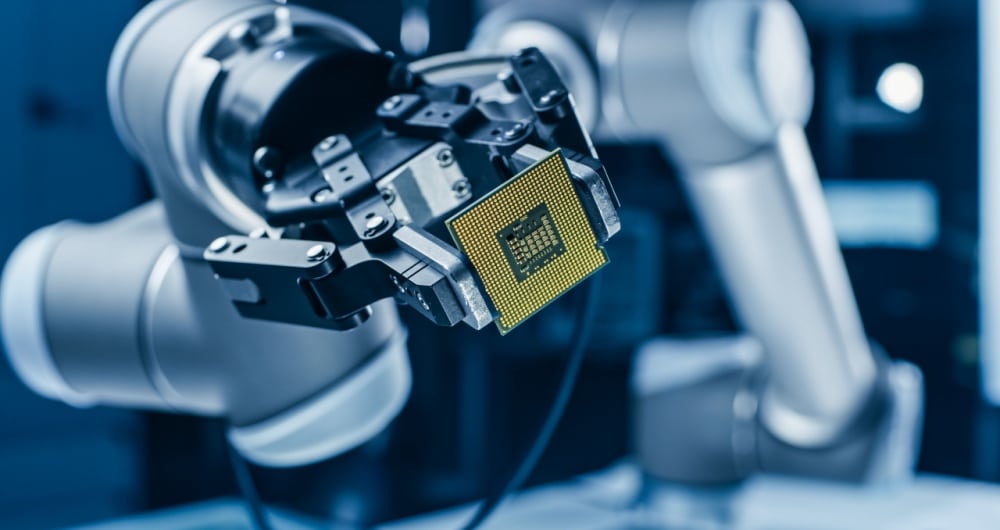Following on from last week’s article, The Future of Manufacturing: Key Opportunities, the Future of Manufacturing series continues with insights around the digital transformation expected to take place in manufacturing.
This week we delve into the opportunities manufacturers can seize in an industry impacted by technology. A survey from Make UK and PwC found that manufacturers are investing in digital technologies more than ever and are already seeing the benefits such as improved product manufacturing, reduced waste, increased productivity, and labour efficiencies. It comes as advanced technologies like robotics, cloud computing, data analytics, and Artificial Intelligence can automate business areas, including manufacturing and supply chains, finance, and HR, that leads to increased productivity. For example, 52% of manufacturers agree that Generative AI will better enhance the impact of the workforce.
So how can manufacturers leverage the opportunities from their investment in technology? First, let’s highlight the 5 key findings around technology:
5 Key Findings for Digital Transformation
1. Digital Technology Adoption
A significant number of manufacturers recognise the potential of digital technologies like AI, cloud computing, and net zero tech, but only a small percentage are making these central to their strategies. This highlights a gap between awareness and implementation. PwC rightly points out the necessity for manufacturers to comprehend the broader strategic significance of digital technology. This understanding can help manufacturers identify valuable opportunities. For example, adopting cloud-based platforms to leverage the capabilities in AI and Generative AI. Doing so can revolutionise almost every aspect of a manufacturers business operations by automating and enhancing them, thereby boosting productivity.

2. Growth Opportunities
In the context of growth opportunities for manufacturers highlighted in the Make UK Executive Survey 2024, the key areas of focus include expanding product portfolios through innovation driven by digital technologies like AI, ML, and IoT; embracing net zero and ESG targets which offer avenues for developing sustainable manufacturing methods, increasing energy efficiency, and producing environmentally-friendly products; and exploring new international markets and export opportunities, particularly in light of emerging trade deals such as the UK/India agreement and the UK’s involvement in the Trans-Pacific Partnership. These opportunities demonstrate a shift towards a more digital, green, and globally connected UK manufacturing sector, which is increasingly leveraging technological advancements and sustainability initiatives to enhance efficiency, product quality, and market reach.
3. Cost Management
High input and energy costs are major concerns, pushing manufacturers to consider cost control as a pivotal strategy. Digital technologies are seen as a means to improve efficiency and manage costs. Digital transformation, through the adoption of technologies like cloud computing, digitalisation of processes, and the integration of AI and IoT, enables manufacturers to streamline operations, reduce waste, and improve overall efficiency. These advancements are key in addressing escalating energy and employment related costs. By leveraging these digital solutions, manufacturers can effectively control costs, a core component of their growth strategy amidst economic uncertainties.
4. Skills & Training
Upskilling and retraining in digital technologies are priorities for manufacturers, indicating a need for a workforce capable of supporting the digital transformation. Nearly 60% of companies are planning to invest in acquiring in-house skills, particularly in IT, digital, line management, and people skills, recognising the necessity of adapting technological advancements. The industry faces labour shortages, making it challenging to rely solely on new recruitment, therefore underscoring the importance of internal skills development. The survey highlights the importance of collaboration between business, government, and academia to address these challenges, suggesting that such partnerships are important for talent retention, encouraging investment in technology, and ensuring supportive digital infrastructure, all aimed at fostering a skilled workforce capable of driving innovation and growth in the sector.
5. Cyber Security & Digital Investment
Highlighted in the Make UK Executive Survey 20024, there is a balanced emphasis on embracing new digital technologies and ensuring robust cyber security. Approximately 44% of companies are planning to invest in new digital technologies, indicating a strong commitment to the digital transformation. Concurrently, the same percentage of businesses also plan to invest in cyber security, acknowledging its critical importance in a digitally driven environment. This simultaneous investment approach suggests that manufacturers are recognising and addressing the challenges of cyber security as an integral part of their digital advancement strategy, rather than viewing it as a separate or secondary concern. This holistic perspective underscores a mature approach to digitalisation, where enhancing digital capabilities and securing them go hand in hand.

3 ways to Leverage Technological Investment with Marketing
It is welcome news that the survey shows a positive response in technology emerging as a key aspect for the future of manufacturing amongst Executives. The adoption of technology provides a solution for the many challenges manufacturers have faced over the last 5 years, and certainly paves the way for potential.
As a specialist B2B manufacturing marketing agency, we recommend manufacturers to harness the power of B2B marketing and leverage the potential of new technology as a means to attract new business and build commercial relationships. Here’s what this could look like:
1. Customer-centric Storytelling & Content Marketing
Manufacturers should develop marketing narratives that focus on the customer’s needs and how their digitally transformed business can help address these needs. Emphasise the problems solved, the enhanced experience provided, and the added value brought to the customer.
Then develop and share content that educates its stakeholders about the benefits and practical applications of their new digital technologies, and how this makes them a more attractive business to work with. This could include case studies, white papers, and webinars to demonstrate the tangible benefits experienced by customers. This could be enhanced product performance that customers have gained through the digitally transformed offerings.
2. Highlight Sustainability and Efficiency Gains
Marketing efforts should focus on demonstrating how technology has helped manufactures meet their ESG and efficiency targets. For example, adopting IoT and AI for predictive maintenance can significantly reduce downtime, while a robust marketing strategy communicates these innovations, attracting global partnerships. Where sustainability is concerned, can make a manufacturer more competitive, particularly in EU markets.
3. Employer Branding & Recruitment
Manufacturers can leverage new technology to become the employer of choice, helping them push through the skilled labour shortage. By highlighting their use of cutting-edge technologies in operations, manufacturers can position themselves as innovative and forward-thinking employers. This is attractive to potential employees, especially those in emerging generations who are tech-savvy and looking to work in progressive and technologically advanced environments.
Need a hand?
At Beach Marketing, we stand ready to partner with manufacturers, leveraging our expertise in the industry to deliver impact, growth, and ROI. Talk to us about outlining a future for your manufacturing business by filling out the form below.
Sign up to our B2B Newsletter
Beach Marketing regularly shares valuable hints, tips, and comprehensive advice. From industrial insights to sailing through the buying cycle, our monthly newsletter talks about everything B2B. Sign-up for first dibs on all the juice below.
